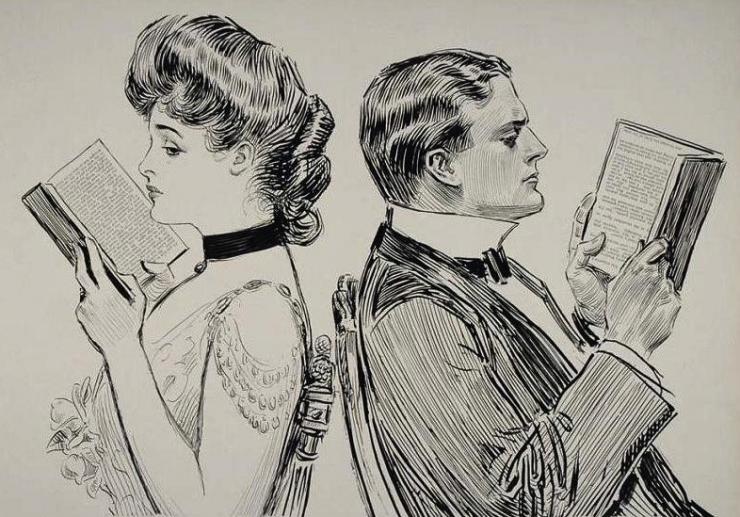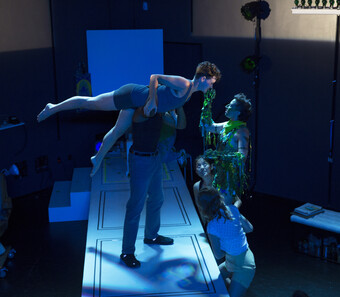Submitting Like A Man
We Have A Winner
This is the sixth installment of the blog series Submitting Like A Man (SLAM), created by writer Mya Kagan. The project examines what happens when Mya resubmits scripts to previously rejected opportunities, this time using a man’s name. For more on SLAM, check out submittinglikeaman.com or follow @theSLAMblog or @Mya_Mya.
Ladies and gentleman, we have a winner. This is not a “royal we”; we refers to Max and I. We got our first notification that Max’s resubmission fared better with his dude name than my original application did with its lady label.
Before you get too excited (or too depressed), I will clarify that Max did not get a full acceptance—he was named a finalist. But when I applied to this same competition, I was flat-out rejected. So I consider him being a finalist to be a distinctly different outcome from my own same experience with this competition, especially because of some details I’ll get into shortly.
But first and foremost, a refresher on my stance about “interpreting” this project: SLAM is art, not science. Many factors in each submission cannot be controlled—presumably different readers, perhaps different needs or wants on the part of the organization, and certainly different fellow applicants in the pool. As such, I stand by my opinion that a singular disparity between Max and I is not enough to make a statement about gender bias on the whole, and anything I say about this competition and its differing results is not something I am glomming onto gender bias at large or our industry in general.
That being said, the disparity is not as cut and dry as “Max was a finalist when Mya was not,” and I do think there's a possibility that in this particular case, there may have been gender bias at play—subconscious or otherwise. Obviously, it’s impossible to “know” in any sort of empirical way, but I couldn’t help ponder it, and I finally figured out my feelings about it while writing and rewriting this blog post (I know, so meta).
Here’s the nitty-gritty:
For starters, it seems like at least one reader may have been the same for both evaluations; the organization is small, and the Artistic Director, who I’ll call Kathy, appears to be a reader every year. I can’t be certain if every reader evaluates each script or if they’re divvied up, but it’s feasible Kathy would have read my scripts both times. And I agree it seems unlikely that Kathy, a woman, would have been biased against another woman’s script, and/or may have favored a man’s script. But it’s been shown, to the surprise and dismay of many, that in some cases female Artistic Directors have been less likely to select work by female writers, and that’s the sneaky thing about bias—we’re all unintentionally susceptible to it.
Another thing that was not the same was the notification. I knew that in my original submission, I’d gotten a form email saying I was not selected. So it gave me pause when Max got a personal email written specifically to him. Not only was it a personal message, but the body of the email sang praises of both scripts Max submitted, particularly the one which was placed as a finalist, and talks about how Kathy and the other judges “loved” the play.
I searched my email to double check the notification I’d gotten when I applied and compare the two. I wondered if they had also loved my scripts and waxed poetically about them? It seems like something I would’ve remembered. And my hunch was correct: It was indeed a form email. It did not praise my scripts; it did not even mention the plays (or me) by name. Whereas Max’s email was warm and encouraging, filled with affection for the plays and (by extension) Max as their author, my email was strictly pragmatic.
Of course, there are a variety of things that could account for this discrepancy. Maybe only finalists and winners get personal notes, or perhaps the theatre changed their notification process and now all applicants get personalized emails. Or perhaps when I applied, my scripts were likewise loved, but everyone was scrapped for time and nobody shared it with me. But I can’t help suspect at least little bit of bias, mostly because I’ve heard it before—that men are more likely to be kindly encouraged or even simply responded to at all—even when they’re being rejected. Take, for example, Catherine Nichols, who sent out query letters for her novel using a man’s name she refers to as “George.” She says of the experience, “Even George’s rejections were polite and warm on a level that would have meant everything to me.” It’s true in classrooms too, where it’s been shown that male students are more likely to be praised and encouraged.
However, to make matters more confusing in this debate of Bias vs. No Bias, there’s an important element on the side of No Bias: The very same notification email that praised Max also listed all the winners of the competition. The second and third places were each awarded to men, but the first place winner was a woman.
With all these factors on both sides of the Gender Bias Equation, you can probably see why I was initially so perplexed on how to feel. And it could be argued that I’m over-scrutinizing items that are small, anecdotal, or speculative. But here’s the thing: Anecdotal or not, this experience doesn’t exist in a vacuum. It exists in a world in which this “equation” is reinforced by a much larger one that makes even less sense, where 51 percent of the population is women but only about 20 percent of our writers in theatre and television are female. For me, even as an optimist, that reality is what tips the scale of this experience towards the side of bias. It’s a tough call to make, because I don’t want to seem like I’m looking for every possible opportunity to cry discrimination. And the organization picked a woman as their first place winner, so it’s clear they don’t have any kind of complete and absolute, balls-to-the-wall bias. (Pun intended.) But I do think that even if being a woman did not necessarily hurt, being a man helped. That doesn’t mean I’m asserting this outcome was definitive partiality, but as a part of the larger experience of my life as a writer and a woman and (now) a “fake man,” I can’t say it feels like coincidence.











Comments
The article is just the start of the conversation—we want to know what you think about this subject, too! HowlRound is a space for knowledge-sharing, and we welcome spirited, thoughtful, and on-topic dialogue. Find our full comments policy here
I submitted a piece to one competition and was rejected. My collaborator (it was a musical) wanted to submit again a year later. I didn't see the point, but allowed the piece to be submitted again. And, wouldn't you know it, we won -- not only the competition, but an Equity production -- the shows first. What was the difference? The readers? Probably. The other musicals that were submitted? More than likely! So, I suspect that the outcome each year had far more to do with the other contenders than any other factor… But, that's just a guess!
I agree that those things are definitely big factors in any evaluation. In fact, I've often resubmitted work as myself (not Max) to the same competitions many years in a row for that very reason -- you never know what being in a different applicant pool with a different set of readers will bring.
With all we know about implicit bias, it's baffling that there are still organizations that are NOT using blind submissions for such competitions. Blind auditions for orchestral musicians have been a 'best practice' in that arts field for DECADES: http://www.nber.org/papers/.... Any literary manager who is organizing an "open competition" like the one described here ought to take the extra steps to make it a blind review process. (I realize this doesn't solve the issue of plays that land on the desk via an agent, but at least would help remove bias from the jurying of competitions).
Fully agree!! Blind submissions need to be standard, and orchestra musicians is a great example. If you're interested, I wrote a post about it recently: http://bit.ly/1URkBEB
I don't want to discount the thoughts expressed or the experiment as a whole because I love it, but it's exceedingly common to only personalize notes to finalists.
Yes, I do agree. What I should have made more clear was that the personalized email "Max" received was formatted partially like a form-letter notification of the winner info/finalist status, with the personalized portion praising the scripts coming at the end like an aside. Almost as if they were just going to send a form-letter, but liked the work so much they just couldn't resist adding this note about it. So to a large extent it was the style of the personalized note that made it stand out.
Aha! Yes, this is the one I've been waiting for. Sending a hug. Because if my emotions are churning at reading this, I think you too might need hugs from friends, tea-and-cake (the equivalent of your choice!), and maybe even a wee cry. All strength to you on this courageous expedition.
Thank you, Marian! I appreciate all the strength and your support of the project. I've been so touched by how supportive people have been of this undertaking -- makes it all much easier. Thank you again :).
:)